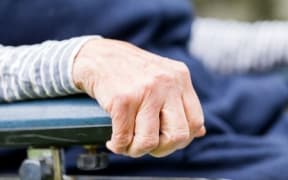A nurses' conference has heard how the pay gap suffered by Māori nurses is forcing them to take on second jobs to make ends meet.

Photo: RNZ / Diego Opatowski
The Nurses Organisation said nurses who worked for Whānau Ora agencies may earn up to 25 percent less than their district health board colleagues.
The organisation's kaiwhakahaere, Kerri Nuku, said the issue was raised repeatedly throughout the conference.
"What we have at the moment is a lot of nurses, Māori nurses working within Māori and iwi providers that get paid significantly less and those nurses definitely go that extra mile, support and work within the communities but don't get recognised for that extra work they do.
"Not necessarily getting a bonus or anything but getting paid comparative rates with their same colleagues within district health boards."
She said nurses were having to take on extra jobs to bridge the gap.
"They're already doing a 40-hour week but some of them are going back to do some part-time work in the community or doing showers at home for patients.
"Any additional work to bring in extra income because the amount they are getting now just isn't working for their households."
Nurses Organisation industrial advisor Lesley Harry said the problem was due to underfunding.
"Without doubt, Māori providers are funded less than their Pākehā counterparts, and that has a direct impact on the terms and conditions - what we are able to negotiate for our Māori members."
UN Permanent Forum for Indigenous Issues expert member Valmaine Toki told the conference that, under the UN Declaration of the Rights of Indigenous People, all indigenous people have the right to determine how they should improve their own health - and governments should take effective measures to ensure this happens.
Ms Toki, who is also a law lecturer at the University of Waikato, said - with statistics showing Māori experiencing high smoking, obesity and mental health rates - there was an even greater onus on the state to provide parity for indigenous health workers.
"Bearing in mind that on the back of those disproportionate statistics, clearly the health system isn't providing what it should for indigenous peoples," she said.
"Māori nurses do a fantastic job and the work they do should be recognised meaningfully within the health sector."
The UN celebrated International Day of the World's Indigenous Peoples during the conference, and Ms Toki said it was an appropriate day to consider how to tackle the terrible health statistics for Māori.
"It's quite poignant that today is International Indigenous Day - that we should all celebrate and, considering those terrible statistics, we look to the rights within the Declaration of the Rights of Indigenous Peoples to try and ameliorate or alleviate those disproportionate statistics."
Ms Nuku said, during the conference, Māori Development Minister Te Ururoa Flavell committed to trying to advance the pay parity issue for Māori nurses.




